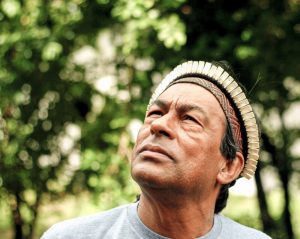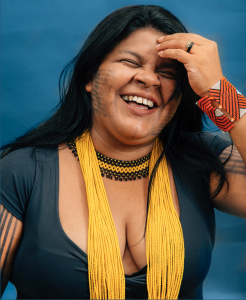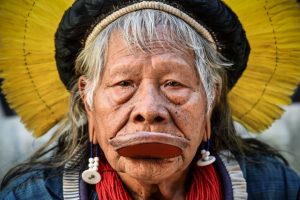Watching Professor Jon’s lecture on the “discovery/conquest” of Latin America in 1492 by Christopher Columbus immediately reminded me of the Brazilian History classes I had growing up. I was taught that Brazil was discovered by the heroic figure of the Portuguese navigator Pedro Alvares Cabral, in April 22, 1500. I remember that my history teachers would discuss whether the Portuguese had actually discovered Brazil, not because the native population already inhabited the region, but because some suggest that they arrived to the region by mistake while others say that navigators prior to Pedro Alvares Cabral had already been to the region.
The fact is that the Portuguese and the Spanish did not discover the region we now call Latin America. The European colonizers invaded the region and were responsible for the genocide of the native populations that had inhabited the region for millennia.
Personally, I believe that it is extremely important to recognize the genocide caused by European colonization. Of course there is no way of amending the past but we do get to shape our present and future. Engaging in decolonization can take several forms including decolonizing food systems, learning about the etymology of words coming from Indigenous languages and learning from Indigenous intellectuals and leadership. For example, do you know how the native peoples called Brazil before the arrival of the European? I didn’t know it until just recently. It was called Pindorama which comes from the Tupi language and means Land of Palm Trees.
As we know Latin America is a vast and diverse region. I encourage each of you to learn more about native/ Indigenous intellectuals and leadership in Latin America. I will share 3 native/Indigenous leadership from Brazil that I admire. Hope you find their work as important and fascinating as I do 😉
Ailton Krenak

Environmentalist and writer, Krenak played a crucial role in the inclusion of Indigenous rights to Brazil’s 1988 Constitution.
Sonia Guajajara

Leader of the Association of Indigenous Peoples of Brazil (APIB) and politician.
http://apiboficial.org/sobre/?lang=en
Chief Raoni Metuktire

Chief of the Kayapó People and Noble Peace Prize Nominee.
sarita ponce
September 13, 2020 — 5:01 pm
Hello Mirella,
Like you, I was taught that Christopher Columbus was some great hero, who made the great discovery of Latin America. I was never taught the reality that is the violent way the Indigenous people were treated. Columbus assumes that the Indigenous were simple-minded and could easily be converted to Christianity. He never once considers whether they have a rich culture and belief system. This same assumption is what leads to the European Colonization and the subsequent genocide as you state. This way of thinking that your culture and religion is called ethnocentrism, and the Spaniards had a bad case of it. I wish I would have been taught this in school and not through social media.
Sarita
mirella reichenbach livoti
September 13, 2020 — 5:36 pm
Hi Sarita,
I couldn’t agree more with you. I’m glad that through social media voices that were unheard can be amplified and can be important educational tools for change. Thanks for your comment 🙂
samantha morillo
September 22, 2020 — 9:18 am
Hello Mirella,
It is so true that in most educations systems, whether it be in American, Canada, Brazil, etc. These European colonizers are praised for their “work” they did for these indigenous communities around the world. Once again showing the huge influence Eurocentric Views have on our day to day life, even today hundreds of years after the fact.
I also completely agree that the first step in making things better for all countries would be educating ourselves in what these indigenous communities went through, from their own accounts, not from a white European male. Only when we educate ourselves in their diverse range of culture will we understand their point of view.
Thank you for the resources and educating us in a small part of your vast culture.
~ Samantha Morillo